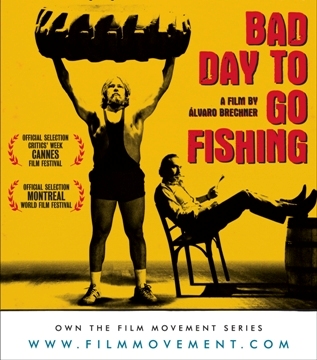Maven's Nest
Reel Life: Flick Pix


BAD DAY TO GO FISHING (MAL DÍA PARA PESCAR)
Directed by Álvaro Brechner
Produced by Álvaro Brechner, Tomás Cimadevilla, Virginia Hinze & Adolfo Blanco
Written by Álvaro Brechner, in collaboration with Gary Piquer, based on the short story "Jacob Y El Otro" by Juan Carlos Onetti
Released on DVD by Film Movement
Uruguay/Spain. 107 min. Not Rated
Spanish & English with English subtitles
With: Gary Piquer, Jouko Ahola, Antonella Costa and Cesar Troncoso
A washed up fighter and his shyster manager are familiar movie types. But the pair who land in a Uruguayan fishing town in Bad Day To Go Fishing (Mal Día Para Pescar) are more intriguing and more complicated than usual. Surprises are foreshadowed in the segue of the opening scenes. From the sylvan sunset over fishing boats, an ambulance speeds to the E.R. from the theater promoting the appearance of the world champion, with some very bad news for the injured man.
The champion is Jacob van Oppen. His scrapbook of old clippings echoes the career of the large, long-haired Finn who plays him, Jouko Ahola, who really has been winner of "strongest man on earth" competitions. Now, it's all Jacob can do to stay awake on a tour of South America as he drinks his way through long bus rides from town to town. His wily promoter calls himself "Prince" Orsini and claims descent from 15th century Italian royalty, but he has descended into MC-ing staged wrestling challenges at dusty arenas in the pampas. The cynical portrayal by the pony-tailed Gary Piquer anchors the film, especially as their partnership gains in complexity and poignancy.
Like the typical flim-flam con man, he baits the town by leaving promissory notes to set up his usual challenge for a paid-off local to face Jacob in the ring for three minutes. He convinces the newspaper editor (Cesar Troncoso) to sponsor the competition with Jacob's unusual back-story – he's a product of the discredited East German sports system who got screwed out of Olympic glory by the fall of the Berlin Wall (which may or may as true as anything else Orsini says).
But Orsini meets his match in picturesque Santa Maria, a mythical town that was the setting for several works by the late acclaimed Uruguayan writer Juan Carlos Onetti, including his 1961 short story "Jacob and the Other" (the title's translation if it were available in English) that inspired his countryman Álvaro Brechner's debut feature film. The locals are not the usual rubes. The biggest man in town he pre-selects to be the (literal) fall guy is already notorious as a hopeless drunk. That's clear to a beautiful and determined young woman Adriana (Antonella Costa) who will use any means necessary to get a different man in the ring to win the $1,000 prize. She convinces the editor to make Orsini show him the money -- money he doesn't really have. And he can't even win it at poker with town's chain-smoking doctor.
As their nemesis, Adriana keeps upping the ante of the film's suspense, from the revelation of her unexpected champion to what's at stake in a challenge of, what Orsini uneasily calls, "youth vs. skill". When the town gets excited about the match, Orsini reels them in by selling tickets, at rising prices, to watch Jacob's desultory work-outs (in between bingo games and accordion players). He can even inspire Jacob by stringing him along about his comeback into professional sports, oddly helped by playing a "Lili Marlene" lullabye.
The story does get bogged down in the pathos of Adriana's and Jacob's problems, and the colorful town doesn't quite rise to the level of classic South American magic realism, even with the quirky character details and the lovely cinematography of Álvaro Gutiérrez (whose talents are also on view in Diego Lerman's The Invisible Eye (La mirada invisible) currently touring in the Global Llens 2011 series). But the ironic twists are worth following to their non-cliché conclusion.
The film will whet your interest to see more of Piquer. He not only worked with the director on this script, but stars in one of the two 20-minute Brechner shorts on the Film Movement DVD release, using what is probably closer to his native British accent. Based on a story by detective writer Harry Kemelman, an intensely loquacious Piquer takes The Nine Mile Walk (2003) through a black-and-white Toledo, Spain. He accepts a Sherlock Holmes-like logic challenge from a Watson-like lawyer friend, who then has to scramble to keep up with his thoughts and pace, as does the entertained viewer.
February 10, 2011
Nora Lee Mandel is a member of New York Film Critics Online and the Alliance of Women Film Journalists. Her reviews are counted in the Rotten Tomatoes TomatoMeter:
 Complete Index to Nora Lee Mandel's Movie Reviews
Complete Index to Nora Lee Mandel's Movie Reviews
Since August 2006, edited versions of many of my reviews of documentaries/indie/foreign films are at Film-Forward; since 2012, festival overviews at FilmFestivalTraveler; and, since 2016, coverage of women-made films at FF2 Media. Shorter versions of my older reviews are at IMDb's comments, where non-English-language films are listed by their native titles.
To the Mandel Maven's Nest Reel Life: Flick Pix
Copyright © 2018



